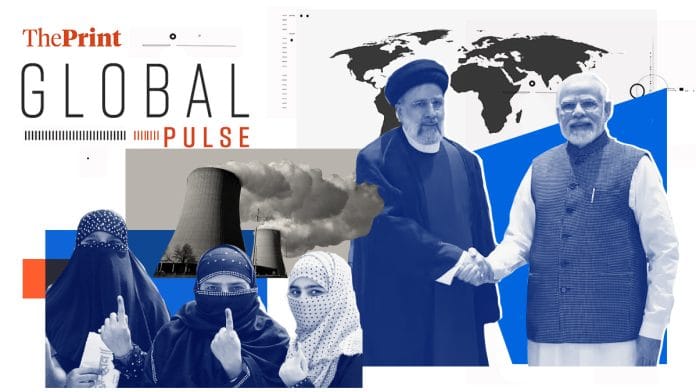New Delhi: Prime Minister Narendra Modi’s election campaign rhetoric highlights a departure from projecting his usual statesmanlike image envisioning “sabka saath sabka vikas” to Muslim-baiting in a more explicit form, says an Economist column, asking “Is the Indian prime minister confident, or worried?”
The Bharatiya Janata Party (BJP) and Modi’s approach have intensified anti-Muslim sentiments in India as evidenced by the dissemination of explicitly anti-Muslim videos and repeated references to themes like “infiltrators” and “vote jihad”, says the column.
The column also raises the possibility of more questions about the election’s legitimacy by the Opposition if the BJP secures a majority and “violent escalation in the streets” if it doesn’t.
The NYT report, ‘Strangers in their own land: Being Muslim in Modi’s India‘, describes how Indian Muslims feel “orphaned” as they struggle to find homes outside Muslim neighbourhoods.
“Members (of right-wing organisations) provoked sectarian clashes as the government looked away, with officials showing up later to raze Muslim homes and round up Muslim men. Emboldened vigilante groups lynched Muslims they accused of smuggling beef… Top leaders in Mr. Modi’s party openly celebrated Hindus who committed crimes against Muslims,” write correspondents Hari Kumar and Mujib Mashal.
‘Does India risk US sanctions over Iran’s Chabahar Port deal?’, an explainer in Al Jazeera discusses the implications of India’s 10-year deal with Iran to develop and operate Iran’s strategic Chabahar Port. The move aims to bolster trade ties with Afghanistan and Central Asian countries, bypassing ports in Pakistan, writes independent journalist Shola Lawal.
“US sanctions threat clouds the pact,” she says, adding that while the US warns against any business with Iran, the Indian foreign ministry hopes to “communicate the benefits” of the deal, highlighting India’s balancing act between maintaining its ties with the US and pursuing its interests independently.
“The country’s exports remain a little lopsided,” reads the Economist piece, Narendra Modi’s
flagship growth scheme is off to a sluggish start, discussing how the government is trying to push the manufacturing sector.
Prime Minister Modi introduced “production-linked incentives” (PLIs) to boost growth, targeting key sectors like electronics and driving growth in phone exports, the report says, noting persistent concerns about reliance on imported parts and bureaucratic hurdles. It says India must streamline processes, focus on broader reforms, and enhance policy implementation to maximise the programme’s impact and foster long-term industrial development.
Staffing crisis among the Tata Group aircraft carriers has led to the grounding of more than 100 Vistara flights and 175 Air India flights, journalist Murali Krishnan writes for DW.
The report, ‘Is the Tata Group’s Air India revamp working?’, examines the overhaul of Air India since the group acquired it in 2022, saying the airline is struggling with concerns over inequality, low pay, and job security among airline staff and often gets passenger complaints about broken seats and malfunctioning screens.
Though the airline industry is booming, Air India has had to order 470 aircraft in February 2023 alone, including from Airbus and Boeing, says the report, adding that the Tata Group “will take considerable time to completely overhaul India’s newly privatised 92-year-old flag carrier”.
In the Guardian report, ‘Targeting India’s most harmful power plants could slash mortality’, air pollution scientist Gary Fuller writes about the pollution generated by India’s power plants. While 3/4th of the coal usage in India is to generate electricity, less than 5% of these plants have “modern systems to clean up air pollutants including sulphur and mercury”, he says.
The author cites a Stanford study, indicating that focusing regulatory efforts on India’s most harmful power plants could substantially lower pollution levels, leading to significant public health benefits, noting that “about a quarter of the health burden came from plants that generated just 3% of India’s electricity”.
Iran’s President dies in chopper crash & ‘attempted coup’ in DRC
Iran’s President Ebrahim Raisi and foreign minister Hossein Amir-Abdollahian died after a chopper made “a hard landing” near Jolfa in Iran’s northwestern province of East Azerbaijan due to poor weather. Read these AP and DW reports to know more about the accident, international reactions and political developments in Iran.
Three people were killed in a shootout between armed men in military uniform and guards of a top politician in the Democratic Republic of Congo in what is being called an “attempted coup”. To know more, read Al Jazeera’s report.
(Edited by Mahdurita Goswami)
Also read: From East to West, India is making a big push for transnational transport corridors. Here’s why






